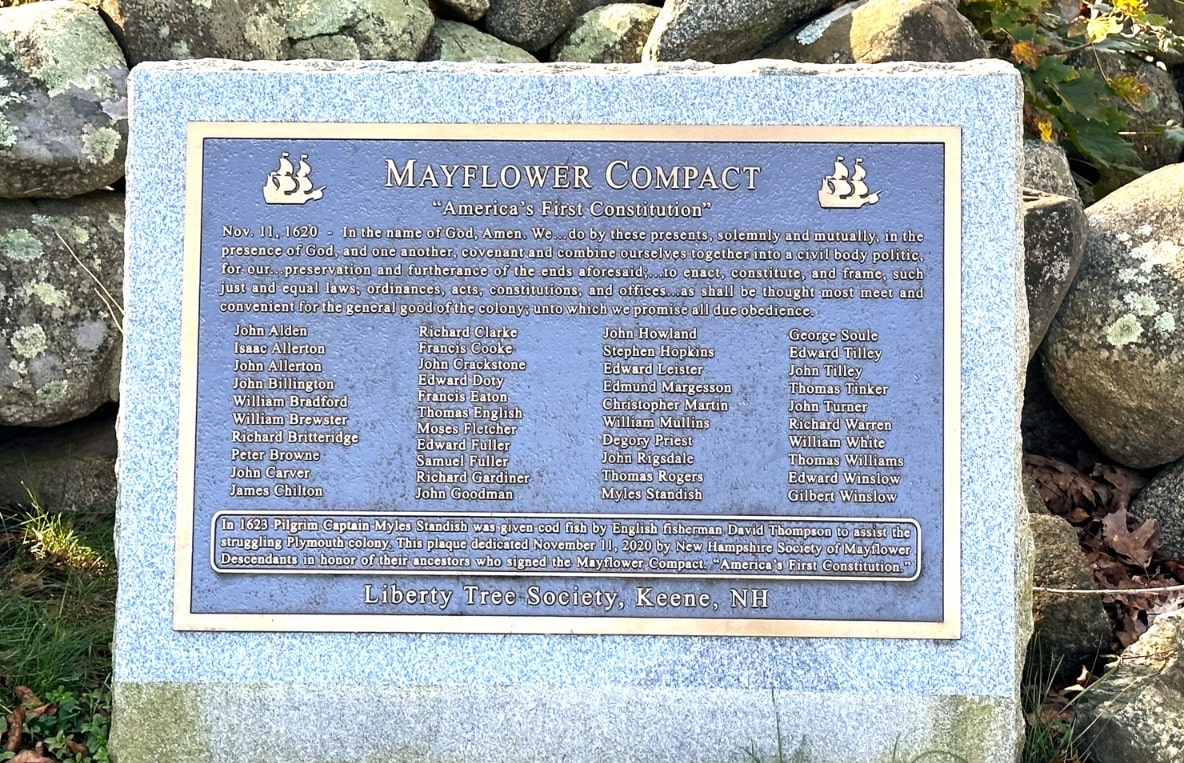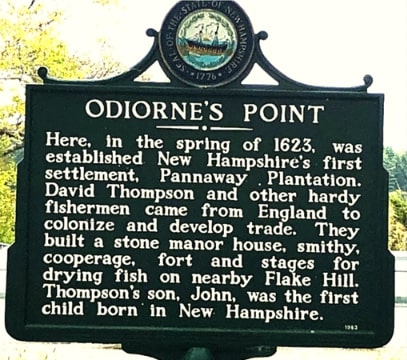Introduction: In this article, Melissa Davenport Berry tells a little-known story about the Pilgrims who celebrated the first Thanksgiving – then needed the help of some English fishermen in New Hampshire for much-needed food supplies only 1.5 years later. Melissa is a genealogist who has a blog, AnceStory Archives, and a Facebook group, New England Family Genealogy and History.
In honor of Thanksgiving, I bring the tale of a meet and greet from 1623 between the Pilgrims of Plymouth, Massachusetts, and the Pannaway Plantation fishermen at the locale now known as Odiorne Point State Park in Rye, New Hampshire.
On 11 November 2020 the New Hampshire Society of Mayflower Descendants gathered together at this spot to unveil a monument commemorating Plymouth’s visit to Pannaway Plantation, and to remember their ancestors who signed the Mayflower Compact.

The inscription on this monument reads:
MAYFLOWER COMPACT
“America’s First Constitution”
Nov. 11, 1620 – In the name of God, Amen. We… do by these presents, solemnly and mutually, in the presence of God, and one another, covenant and combine ourselves together into a civil body politic, for our… preservation and furtherance of the ends aforesaid; …to enact, constitute, and frame, such just and equal laws, ordinances, acts, constitutions, and offices… as shall be thought most meet and convenient for the general good of the colony; unto which we promise all due obedience.
| John Alden | Richard Clarke | John Howland | George Soule |
| Isaac Allerton | Francis Cooke | Stephen Hopkins | Edward Tilley |
| John Allerton | John Crackstone | Edward Leister | John Tilley |
| John Billington | Edward Doty | Edmund Margesson | Thomas Tinker |
| William Bradford | Francis Eaton | Christopher Martin | John Turner |
| William Brewster | Thomas English | William Mullins | Richard Warren |
| Richard Britteridge | Edward Fuller | Degory Priest | William White |
| Peter Browne | Samuel Fuller | John Rigsdale | Thomas Williams |
| John Carver | Richard Gardiner | Thomas Rogers | Edward Winslow |
| James Chilton | John Goodman | Myles Standish | Gilbert Winslow |
In 1623 Pilgrim Captain Myles Standish was given cod fish by English fisherman David Thompson to assist the struggling Plymouth Colony. This plaque dedicated November 11, 2020, by New Hampshire Society of Mayflower Descendants in honor of their ancestors who signed the Mayflower Compact. “America’s First Constitution.”
Here is a photo of the dedication ceremony for the Mayflower Compact Monument at Odiorne Point. Dressed in period costume, from left to right, are: New Hampshire Society of Mayflower Descendants Governor Heather Wilkinson Rojo; Sophie Morrow Jr., Society member; and Anne Vadakin, Deputy Governor.
David Thompson, who gave the cod fish to the hungry Plymouth Pilgrims just a year and a half after they had celebrated the first Thanksgiving, is referenced in William Bradford’s Of Plymouth Plantation. Thompson, a Scotchman, and a few others arrived in the New World onboard the ship Jonathan in the spring of 1623.
They landed at what is now called Odiorne Point in the present-day town of Rye, New Hampshire. Thompson had been granted land to form a colony, which he named Pannaway Plantation – the first European settlement in what became the state of New Hampshire.
The sole intention for this settlement was to build a prosperous colony that would financially benefit both its residents and the investors who bankrolled the enterprise.
The Union Leader published an article giving more details about Pannaway Plantation.
This article reported:
Capt. John Smith, swashbuckling soldier of fortune and explorer… had spent one summer exploring the coast [of New Hampshire, in 1613] for whales… and searching the shore for “gold and copper mines.” But what he did find – and in abundance – was, as he expressed it, “the ocean is a veritable fishpond.”
Fishermen sailed from England, ballasted in salt, and spent the summer catching and salting cod fish in temporary camps on shore. In the fall they set sail for England with a highly profitable cargo.
So profitable, in fact, were these salt cod fish that the merchants who made up the Plymouth Council contracted with David Thompson, a Scotchman, to become the first permanent settler of Portsmouth [New Hampshire].
…Unlike the Plymouth Colony, Thompson and his anonymous mates had not come over in search of religious liberty, but to catch cod fish, trap fur bearing animals, trade with Indians, and form a permanent colony. The sponsoring merchants provided transportation, provisions and tools, trade goods, and seed. This was to give the settlers a start. After five years the colonists would divide profits with the merchants – and the land would belong to the settlers.
More ships followed, bringing Thompson’s wife. Amias Cole, and the rest of the overseers (totaling seven) to help build the enterprise – “And from these tiny beginnings of the seven who stayed, New Hampshire’s greatest seaport city [Portsmouth] sprang.” The article contained a mention of Miles Standish’s visit:
Miles Standish, fiery little captain of Plymouth Colony’s militia, visited Thompson. Thompson was able to provide him with needed provisions – mostly salt fish – for the winter.
There is an earlier monument, from 1899, that sits near the Mayflower Compact Monument at Odiorne Point, honoring David Thompson and the first settlers who met with the Plymouth Pilgrims.
The inscription on this monument reads:
Here landed in the spring of 1623 the first band of Englishmen, pioneers in the planting of New Hampshire, consecrating this soil to the service of God and liberty.
The Boston Herald published an article about the dedication of this monument.
This article reported:
The granite monument erected at Odiorne Point, Rye, on the site of the first settlement in New Hampshire, May 1623, was formerly dedicated this afternoon [21 October 1899] by the National Society of the Colonial Dames of America in New Hampshire, through whose efforts the monument was erected.
While the first Thanksgiving in Plymouth is the most celebrated, I believe the name of David Thompson should be kept sacred, as he greatly assisted in the preservation of the colony one winter as well.
Happy Thanksgiving!
Explore over 330 years of newspapers and historical records in GenealogyBank. Discover your family story! Start a 7-Day Free Trial
Note on the header image: Odiorne Point historical marker. Credit: Kester Allen.
Related Articles:
